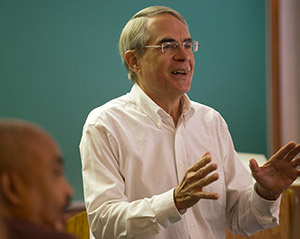 For nearly 20 years, the Rev. Dr. Ron Cole-Turner, H. Parker Sharp Professor of Theology and Ethics, has been helping Pittsburgh Theological Seminary students navigate the theological implications of modern advancements in science and technology. Also a leader in conferences and professional societies in his field, he recently participated in an international theological colloquium at the University of Geneva, Switzerland, on the theme of eschatology.
For nearly 20 years, the Rev. Dr. Ron Cole-Turner, H. Parker Sharp Professor of Theology and Ethics, has been helping Pittsburgh Theological Seminary students navigate the theological implications of modern advancements in science and technology. Also a leader in conferences and professional societies in his field, he recently participated in an international theological colloquium at the University of Geneva, Switzerland, on the theme of eschatology.
“In the world of science,” notes Ron, “there have been a number of recent developments in the study of human origins. At the same time, new technologies are emerging that have the potential to modify human beings at the genetic level,” he continues. So Ron presented an exploration of the theological implications of these developments. He asked questions such as, How should we think about humanity, both past and future? How should we think about the transformation of creation and its consummation, particularly with reference to humanity? How should we think about God’s plan for the gathering up of all things in Christ, again with particular reference to humanity? “Christian eschatology isn’t just about how the world ends,” Ron notes. He concludes that ultimately, through the Incarnation, humanity is made one not only with Christ but also with itself.
As the home city of John Calvin, Geneva provided an interesting atmosphere to consider this topic. Ron attended a Sunday morning Church of Scotland service at Calvin’s Oratory (where John Knox preached and Calvin taught), and he celebrated the Eucharist at Calvin’s church, St. Pierre, flagship of the Swiss Reformation. “The interior of the church remains similar to what it looked like in Calvin’s day,” notes Ron, “so I felt like I was part of that history, while at the same time I was participating in very future-oriented discussions.” For Ron, a highlight of the colloquium itself was the opportunity to hear a “superb talk” on eschatological ontology by Greek Orthodox scholar John Zizioulas, Metropolitan of Pergamum.
Before Ron’s paper appears as part of a book of articles from the colloquium, he will present some of his ideas in the adult education program of The Presbyterian Church, Sewickley, at the end of November. An ordained minister of the United Church of Christ, Ron is also a founding member and current vice president of the International Society for Science and Religion. He has served on the advisory board of the John Templeton Foundation and the Metanexus Institute.
